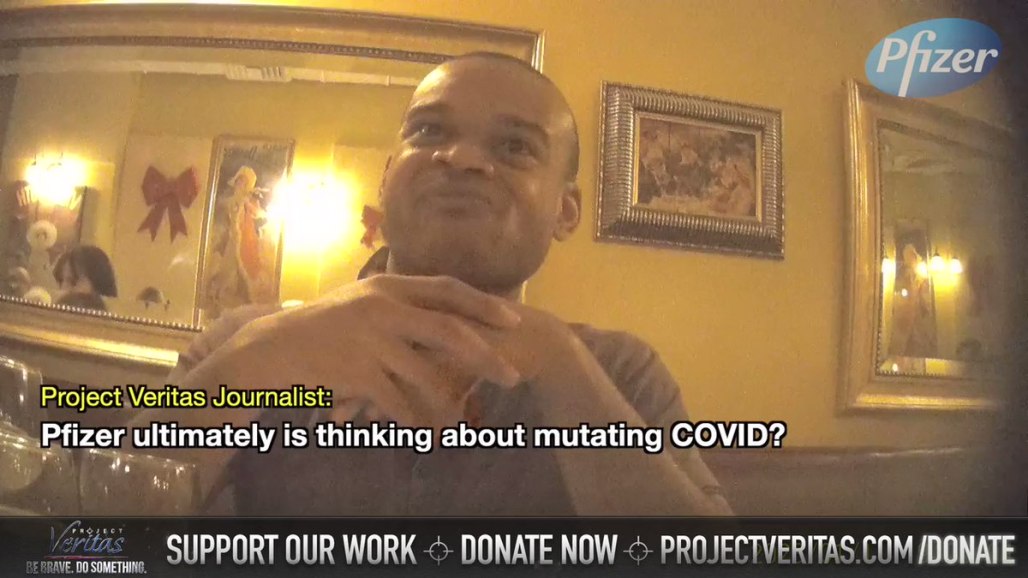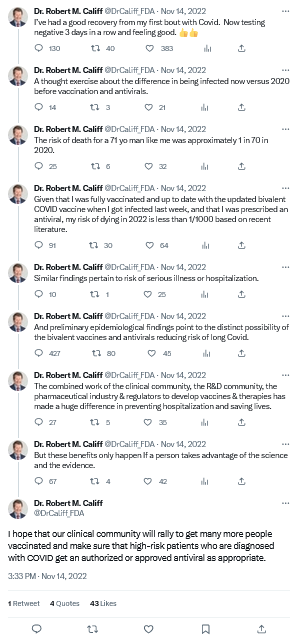RFK, Jr. Wants To Ban Big Pharma Ads
Part One: Can A President Dictate Pharmaceutical Advertising?
In a recent tweeted-out video, Democratic Presidential hopeful Robert F. Kennedy, Jr., articulated a proposal to ban pharmaceutical ads from corporate media, particularly television.
Kennedy’s proposal has been met with favor by more than a few writers here on Substack. Medical writer Maryanne DeMasi, PhD, embraced the idea wholeheartedly in an article at the end of May.
Democratic presidential candidate Robert F. Kennedy Jr recently said that if he becomes president, he will ban pharmaceutical advertising on US television.
Kennedy’s position1 is that direct to consumer advertising (DTCA) is fundamentally harmful.
it's not good to have pharmaceutical advertising on tv. It's good for the television state missions. It's good for, um, the pharmaceutical companies, but it's not good for public health.
Kennedy also makes an interesting assertion: The President of the United States can, by executive order, require the FDA to effectively ban pharmaceutical advertising.
I'm gonna take certain steps to try to make sure that happens. And one is to get, you know, pharmaceutical advertising off of tv. The president can do it by executive order with a stroke of the ban. He can force fda, uh, to promulgate regulations to remove it
A point of full disclosure: When it comes to railing on Big Pharma’s rampant corruption and malignant influence on the Federal government, I am quite in agreement with Robert Kennedy.
However, agreeing with Robert Kennedy on the problem does not automatically mean that his proposal is the right or even the best solution for the problem.
Regardless of how well-intentioned such a ban might be, in order to support it we must first be assured that such a ban lies within the FDA’s competence, and, by extension, the President’s competence to order such a ban.
Does the President have the power to ban pharmaceutical advertising as Robert Kennedy suggests?
It is difficult to see how.
While the Federal Food, Drug, and Cosmetic Act2 does empower the Health And Human Services Secretary along with the Food And Drug Administration to weigh in and approve marketing materials for approved drugs and therapeutics, the Act’s delegated regulatory authority does not entail a blanket prohibition on the use of specific media.
21 USC §353c(a) specifically empowers the Health and Human Services Secretary (and, by delegation, the FDA), to review television advertisements.
The Secretary may require the submission of any television advertisement for a drug (including any script, story board, rough, or a completed video production of the television advertisement) to the Secretary for review under this section not later than 45 days before dissemination of the television advertisement.
§353c(b) grants the HHS Secretary the authority to make recommendations on the content of such advertising to ensure that they are not misleading.
However, §353c(c) specifically delimits the Secretary’s authority to only the powers specified in the section:
Except as provided by subsection (e), this section does not authorize the Secretary to make or direct changes in any material submitted pursuant to subsection (a).
§353c(e) lays out the limited scope of changes the HHS secretary may require of Big Pharma. That scope is limited to disclosures on risks and safety protocols.
(1) Serious risk; safety protocol
In conducting a review of a television advertisement under this section, if the Secretary determines that the advertisement would be false or misleading without a specific disclosure about a serious risk listed in the labeling of the drug involved, the Secretary may require inclusion of such disclosure in the advertisement.
Nowhere in §353c is the HHS Secretary empowered to unilaterally withhold approval. HHS can only withhold approval pursuant to changes the advertising which the HHS may recommend. The very fact that the HHS is expected to make such recommendations argues against any construction of this language to encompass an outright ban on an advertisement.
Even within the regulations implementing the FFDCA and the HHS Secretary’s authority to review pharmaceutical advertising (21 CFR §§601.453 and 601.944) stop short of authorizing explicit bans on such advertising.
For biological products being considered for approval under this subpart, unless otherwise informed by the agency, applicants must submit to the agency for consideration during the preapproval review period copies of all promotional materials, including promotional labeling as well as advertisements, intended for dissemination or publication within 120 days following marketing approval. After 120 days following marketing approval, unless otherwise informed by the agency, the applicant must submit promotional materials at least 30 days prior to the intended time of initial dissemination of the labeling or initial publication of the advertisement.
The HHS Secretary by and through the FDA is currently empowered by statute to establish standards of varying degrees of rigor on pharmaceutical advertising, but the plain text of both the statute and the implementing regulations stop short of an outright ban.
The FDA can only promulgate regulations pursuant to statutory grants of authority by the Congress. Before a government agency can regulate, Congress must appropriately delegate. This is clearly articulated in, among other decisions, National Latino Media Coalition, et al5
A valid legislative rule is binding upon all persons, and on the courts, to the same extent as a congressional statute. When Congress delegates rulemaking authority to an agency, and the agency adopts legislative rules, the agency stands in the place of Congress and makes law.
The FFDCA delegates considerable rulemaking authority to the HHS Secretary and the FDA, but the rulemaking authority to issue blanked bans on pharmaceutical advertising is not a delegated authority.
If we accept the full Constitutionality of the FFDCA (which itself is a topic for a different article, and for now is merely not being challenged), before such a ban could be enacted, additional legislation would have to be passed by Congress amending the FFDCA to grant the HHS Secretary and the FDA the proper authorities.
Moreover, nothing in the FFDCA itself suggests that the President can unilaterally order the FDA to impose such a ban. Where Congressional authority is not delegated, Presidential executive orders may not be imposed. This has been the understanding of the Supreme Court since at least the Youngstown Sheet & Tube Co. v. Sawyer case6 during the Korean War.
The President's power, if any, to issue the order must stem either from an act of Congress or from the Constitution itself.
Certainly the Constitution provides no authority for Robert Kennedy’s proposed executive order. Article 2 Section 3 of the Constitution empowers and charges the President with enforcement of the law. It does not empower enlargement of the law.
he shall take Care that the Laws be faithfully executed
The FFDCA itself is detailed and exhaustive in the authorities delegated to the HHS Secretary and, by imputation, to the FDA. As the FFDCA does not delegate such authority, the President may not arrogate to himself that authority. Harry Truman could not do it in time of war; it is highly improbable Robert Kennedy could do it in time of peace.
None of this is to say that pharmaceutical advertising and its impact on the delivery of healthcare is not an issue. The hue and cry we have witnessed these past few years over the trope of “COVID Misinformation” alone is testament to the reality that getting accurate information about therapeutics is an important and, unfortunately, a somewhat controversial issue.
However, we should not be so blithe as to think the issue is solely one of pharmaceutical advertising, especially given the extent to which the CDC and the FDA have both ignored safety signals surrounding Big Pharma’s mRNA inoculations, all the while explicitly asserting their fundamental safety and efficacy (they have neither).
How much impact can a pharmaceutical advertising ban have when the CDC is demonstrably lying about a pharmaceutical product’s overall safety?
How much can we trust the FDA to issue effective and sane regulations on therapeutics of any kind when they are shown to have taken up an advocacy role to on behalf of the pharmaceutical industry—even to the extent of lying about Ivermectin?
This last point is something even Dr. DeMasi acknowledges.
FDA commissioner Robert Califf, for example, repeatedly advertised the benefits of Pfizer’s antiviral drug paxlovid and covid-19 vaccines for reducing the risk of long covid.
Indeed, Robert Califf’s tweet thread on his COVID experience could pass as paid-for advertising for Pfizer.
And who could possibly forget this acme of deceptive and outright false medical advertising by none other than the FDA.
Time and again we have been subjected to utter falsehoods from the FDA that there is “no evidence” on the efficacy of Ivermectin.
This is the agency that Robert Kennedy proposes to use to rein in the corrupt advertising practices of Big Pharma. Even if the Presidential authority he envisions existed, this agency is so demonstrably captured by the industry it purports to regulate that its utility in enforcing even uncontroversial regulations is very much in doubt. It accomplishes nothing if the agency charged with rooting out corruption within Big Pharma advertising is itself incurably infected with corruption—and there is little doubt but that the FDA is incurably infected.
Similarly, if pharmaceutical advertising is banned, could that also inhibit the dissemination of contrarian information about the mRNA inoculations? Could information on the benefit of Ivermectin also get caught up in such a ban?
However we address the issue of Big Pharma’s cynical information manipulations, we absolutely need to be certain we do not throw the proverbial baby out with the proverbial bathwater. However we resolve the issue of bad information we must be certain we do not at the same time suppress good and necessary information. We’ve already seen that; we do not need more of that.
As the entirety of the factual record of the Pandemic Panic demonstrates in abundance, there is a tremendous need for reforming the methods by which people in this country are informed. Far too many people in far too many walks of life are simply getting bad information.
They are getting bad information from their doctors.
They are getting bad information from Big Pharma.
They are getting bad information from Big Government Bureaucrats.
However, the solution to bad information is not to suppress information, but to provide good information.
Robert Kennedy is to be commended for confronting the shortcomings of pharmaceutical messaging, especially pharmaceutical advertising.
However, his proposed solution comes up short in terms of its legality as well as in terms of its probable efficacy.
Robert Kennedy is half-right on this. We do need a solution. However, we need a solution that not only is legal but also stands a halfway decent chance of actually working.
Kennedy’s quotes are extracted from the video via the GoTranscribe free transcription service and copied directly therefrom.
21 USC Chapter 9 §301 et seq
The National Latino Media Coalition, et al., Petitioners, v. Federal Communications Commission and the United States Of America, Respondents,microband Corporation of America, Sin, Inc., Intervenors.youth News, Petitioner, v. Federal Communications Commission and the United States Of America, Respondents, 816 F.2d 785 (D.C. Cir. 1987)
Youngstown Sheet & Tube Co. v. Sawyer, 343 U.S. 579 (1952)









Seems like an ineffective measure, but it has good optics . There are better ways to fight pharma . Stop giving them Medicaid dollars! The cost of those barely approved drugs is insane ! Pharma is bankrupting Medicaid and Medicare . The whole system is broken . Doctors are working for pharma . Drugs are developed with profits in mind, not healing or helping .
Long overdue!!!